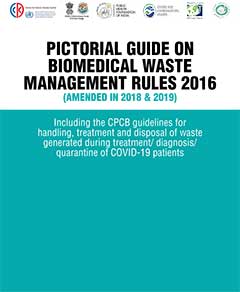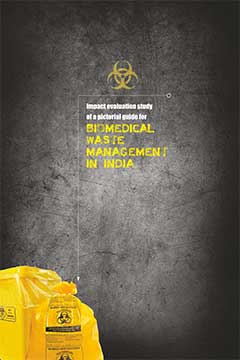Resources
Health Care Waste Management
Pictorial guide on Biomedical Waste Management Rules 2016 (Amended in 2018 & 2019)
To strengthen the compliance and implementation of revised rules, Centre for Chronic Disease Control (CCDC) along with Centre for Environmental Health (CEH)−Public Health Foundation of India (PHFI) and Health Care Without Harm (HCWH) has developed the Pictorial Guide on Biomedical Waste Management Rules 2016. It is a compilation of important strategies that are key to appropriate management of bio-medical waste in India. These include presentation of the important elements of bio-medical waste management in an illustrative format thus aiming to overcome the barriers in understanding the comprehensive rules and facilitating implementation by healthcare workers on the ground.
This guide has been endorsed by the Ministry of Environment, Forest and Climate Change.
Impact evaluation study of a pictorial guide on biomedical waste management rules
The Pictorial Guide on Biomedical Waste Management (BMWM) Rules, 2016 (amended in 2018 & 2019), was released in 2020 to provide a quick, user-friendly view of the important elements of biomedical waste handling, treatment, and disposal. This report provides the findings of a study to evaluate the impacts that the pictorial guide has had on the knowledge, aitude, and practices of the study groups regarding biomedical waste management. It also highlights the key challenges faced by the healthcare workers while handling the COVID-19 associated biomedical waste.
Waste Trackers
Health Care Without Harm and HECAF360, developed six tracking tools for health care facilities to understand and control their waste management.
Each tracker is specially designed for a different stage of the waste management process, and they may be filled in by different people playing different roles in a hospital or health system. Optimized for daily data entry, the tracker produces clear summary tables and graphs that a waste manager, waste management committee, or facility director can quickly view to assess their performance and make informed decisions to improve.
Plastics Assessment Toolkit
This toolkitk was developed to help health facilities and the health care sector confront the plastic pollution, change the narrative, introduce solutions and alternatives and work together for a healthier, more sustainable planet for the next generation. As a toolkit, it contains the following major elements: Information on life cycle hazards of different polymers, long term vision and short-term recommendations for action, how-to guide on the conduct of simplified plastics audit, guidance on how to reduce plastics within healthcare, outline of advocacy options within and beyond the healthcare sector, and compilation of available case studies on plastics from GGHH Network members both in Southeast Asia and beyond.



